On the Origin of the Partial Hallel
Couldn't load pickup availability
The practice of partial Hallel - reciting Psalms 113-118 with key passages omitted on Rosh Hodesh and the final days of Passover - emerged not as a marker of lesser religious significance, but as a distinctly Babylonian innovation in Jewish liturgical development. Through analysis of Talmudic sources, Tosefta texts, and early rabbinic literature, significant discrepancies emerge between Palestinian and Babylonian practices in the post-Temple period. While Palestinian communities originally omitted Hallel entirely on these occasions, Babylonian Jewish communities, removed from Temple traditions, introduced a modified recitation that deliberately excluded Psalm 115:1-11 and Psalm 116:1-11. Comparative textual analysis of Palestinian and Babylonian sources reveals that this selective omission served as a sophisticated compromise, allowing Babylonian Jews to maintain their desired liturgical expression while acknowledging departure from established halakhic norms. The evidence, particularly the Tosefta's complete exclusion of these days from Hallel requirements, demonstrates how regional variations in post-Temple Judaism shaped liturgical adaptation, challenging long-held assumptions about the hierarchical significance of partial Hallel in Jewish practice.

More Information
-
Physical Description
-
Publication Information
Published 1969
ISBN
-
Publication Credits
Reuven Hammer

